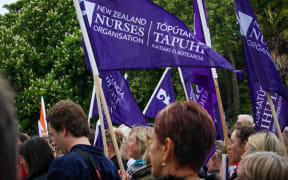
Photo: RNZ / Angus Dreaver
The ACT Party is promising to make it easier for migrants to join New Zealand's health system, expand primary care roles, and allow ministers to override regulators.
Announcing the party's policy for tackling health workforce shortages, ACT health spokesperson and deputy leader Brooke van Velden said these changes along with better workforce planning would mean a "flourishing health system, not one on life support".
The policy would include:
- Establish an Occupations Tribunal to assess equivalent overseas qualifications and work histories
- Enable the health minister to override decisions or processes of regulatory authorities like the Nursing Council if the minister believes that goes beyond what is necessary to protect public health and safety
- Expand physician assistants' licences to allow them to provide more services, supporting GPs
- Embed "intelligent forecasting" using population growth and ageing, and technological changes into health workforce modelling
"If we don't address the fundamental problems with the regulatory system, the situation could get worse given our ageing population and nearly half of all GPs plan to retire in the next 10 years," van Velden said.
She said New Zealand already has a Trans-Tasman Mutual Recognition Act with Australia, which could be used as a model to cover more countries under the Occupations Tribunal.
"We are turning away qualified and experienced migrants who want to work here. Rather than embracing these qualified workers with open arms, New Zealand sets up impossible bureaucratic hoops for migrants to jump through, causing even the keenest migrant to leave our country for more welcoming shores," van Velden said.
Last month, the government released its Health Workforce Plan, developed with Te Whatu Ora and Te Aka Whai Ora. It estimated New Zealand was already 8000 workers short, and would need to recruit or train an additional 1600 health professionals a year for the next ten years to keep up with anticipated population growth.
It focused on recruitment and retention including through earn-as-you-learn programmes, iniatiatives to support those with health qualifications to return to the workforce, expanding rural and interdisciplinary training, and greater access to cultural and harship support for Māori and Pacific health students.
ACT said the government's projections assumed models of care, training pathways, and retention approaches would not change.
"We need to use intelligent forecasting which embraces conditions of uncertainty in order to enable innovation and the development of new models of care. Conditions of uncertainty can take into account changes in technology, migration patterns, the cost of inputs, and the implications of population ageing."
ACT has also already announced it would boost GP practices funding by 13 percent.






